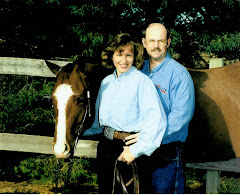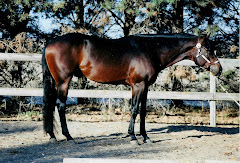Does anyone rememeber PETA NOT supporting the ban when it happened???
(NOT to get into a PETA debate here, but I'm just saying. PETA doesn't want us to eat, wear, experiment with or abuse animals, as stated on their website). WHy would they not speak up about slaughter back then, and support it? Maybe one day, we'll list what PETA has done to hurt the horse industry, besides slaughter, rodeos, etc).
No debates. Not now. My head hurts just thinking about it and we'll let another site out there with broader shoulders than me, approach that topic. I'm just interested in knowing what is going to happen next to our horse industry.
Like I said on FB:
Maybe horse prices will go back up now. Our industry has taken a nose dive in
the value of a horse. Horses worth $5000 10 years ago are worth $1000-2000 now,
and that's only if they are dead broke (no pun inteneded) and kid safe. Maybe
we'll see a lot less starving horses. No one wants to see a horse go to
slaughter, but no one wants a horse to starve to death.
Full article below.
http://www.csmonitor.com/USA/2011/1130/Lifting-horse-slaughter-ban-Why-PETA-says\
-it-s-a-good-idea
Lifting horse slaughter ban: Why PETA says it's a good idea
PETA, the animal rights organization known for ad campaigns like 'fur is
murder,' says domestic horse slaughter facilities are preferable to shipping
horses to Mexico or Canada for slaughter.
By Patrik Jonsson, Staff writer / November 30, 2011
Cheri White Owl, founder of Horse Feathers Equine Rescue, is pictured with one
of the 33 horses she is currently caring for in Guthrie, Okla. on Tuesday.
Slaughterhouses could be ready to kill horses within a month if the US
Department of Agriculture provides funding for meat inspectors, days after
Congress quietly opened the door to the practice by lifting a 5-year-old ban on
spending federal money on such inspections.
Sue Ogrocki/AP
Congress has found what many may think of as an unexpected supporter in its
decision to bring back horse slaughter facilities to the US after a 5-year-ban:
People for the Ethical Treatment of Animals (PETA), the often-controversial
animal rights group known for campaigns like "fur is murder."
Way cleared for horse slaughter to resume in US after 5-year ban
Horse racing under new congressional scrutiny
Horse racing moves to reform, but faces many skeptics
In an interview with the Monitor, PETA founder Ingrid Newkirk said the US should
never have banned domestic horse slaughter – a stance that has put the
organization at odds with other mainstream animal rights groups, like the
Society for the Prevention of Cruelty to Animals (SPCA).
"It's quite an unpopular position we've taken," Ms. Newkirk says. "There was a
rush to pass a bill that said you can't slaughter them anymore in the United
States. But the reason we didn't support it, which sets us almost alone, is the
amount of suffering that it created exceeded the amount of suffering it was
designed to stop."
While PETA says the optimal solution is to ban both consumption slaughter and
export of horses, it supports reintroducing horse slaughterhouses in the US,
especially if accompanied by a ban on exporting any horses at all to other
countries.
There are now plans in over half a dozen states in the South and West to begin
horse slaughter processing, a business worth about $65 million a year before
Congress defunded the inspection regime. While unpalatable to most Americans,
horse meat is eaten in Mexico, Asia, and parts of Europe.
As Newkirk predicted, the end to domestic slaughter didn't curtail the number of
horses being slaughtered for consumption, but, according to a GAO report, may
have led to more inhumane treatment of old, abandoned, or neglected equines as
greater numbers were instead shipped to Mexico or Canada for slaughter where the
USDA doesn't have the authority to monitor the horses' conditions.
The number of horses exported from the U.S. to Mexico, for example, increased by
660 percent since the de facto ban, the Government Accounting Office reported in
June. Almost 138,000 horses were shipped out of the country for slaughter in
2010, compared to the 104,899 horses that were slaughtered domestically in the
year before the ban took effect.
"It's hard to call [the end of the horse slaughter ban] a victory, because it's
all so unsavory," Newkirk says. "The [funding] bill didn't mean any horses were
spared, but it does mean the amount of suffering is now reduced again."
Come on over to my chat,
Horses Are Our Lives Chat Group, to talk about this, but only if you have some good comments and insights. I don't need debates, only input on the good and bad, and how to move on to inprove the horse industry.























































